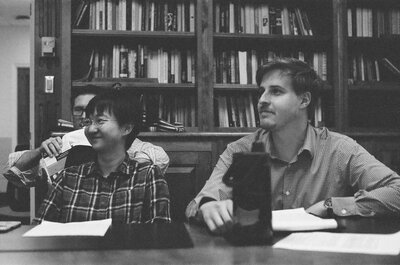

General regulations concerning admission and advanced degrees in the Graduate College of the University of Illinois can be found in A Handbook for Graduate Students and Advisors which, along with other information and forms, can be accessed at the Illinois Grad College website. Graduate students in philosophy are expected to be familiar with these, as well as with the special regulations below.
Department of Philosophy Graduate Studies Handbook
Below is a summary of the current program regulations, please refer to the Graduate Student Handbook for more details.
Goals of PhD Program:
- provide professional-level knowledge in philosophy to advanced students;
- prepare students for post-secondary teaching and participation in the varied activities of the profession, as well as for related academic or non-academic fields;
- prepare students to identify, develop, and pursue research interests;
- guide students in the production of written work of professional quality;
- help students prepare dissertations that make significant and original contributions to their chosen areas of specialization.
Degree Requirements
Course Credits
Graduate courses at the University of Illinois are currently designated by a 400- or 500-level
number (e.g., PHIL 421, PHIL 511). Enrollment in courses at the 500-level is generally reserved
only for graduate students. Courses offered at the 400-level are open both to graduate students
and to advanced undergraduate students. The number of hours assigned to 400- and 500- level
courses varies. Degrees are awarded based on the total number of hours completed, not the total
number of courses.
Course Loads
Graduate students (other than those in the Third Stage of the Doctoral Program) are normally expected to take 12 credit hours each semester. Graduate students should not deviate from these general rules without first consulting with their advisors and receiving the approval of the Director of Graduate Studies. (deviations may jeopardize financial assistance, as well as good standing in the Graduate College and satisfactory progress in the department).
Program Stages
The Graduate College Handbook distinguishes three Stages within the Ph.D. program:
Stage I
- is completed when a student has earned the requisite 32 hours of graduate credit (see 2.5 and 2.7 below for further details), including any courses approved for transfer of credit, and has been formally admitted to Stage II by the Department (via the Second-Year Review, see 2.6 below).
Stage II
- is completed when a student has earned the requisite 32 additional hours of graduate credit (see 2.7 below for further details); has satisfied the Course Distribution, Language, and Symbolic Logic requirements; has passed the Preliminary Examination; and has fulfilled any extra-departmental minor course requirements undertaken voluntarily. The Department of Philosophy requires that the Distribution, Language, and Symbolic Logic requirements be satisfied before it will certify to the Graduate College that a student has passed the Preliminary Examination.
Stage III
- is completed when a student has earned the requisite additional 32 hours of graduate credit (see 2.10 below for further details), prepared a dissertation, and passed the Final (Doctoral Oral) Examination. Students should note that PHIL 599 is a graduate course, and hours from it count toward the 32 hours of graduate credit.
Course Distribution Requirements: Stages I and II
64 hours of graduate course work (16 graduate courses)
- 8 hours (2 graduate courses, at least one of them a graduate seminar) must be earned in courses in the history of philosophy.
- 8 hours (2 graduate courses, at least one of them a graduate seminar) in courses in practical philosophy (understood to include moral philosophy, social and political philosophy, and/or aesthetics).
- 8 hours (2 graduate courses, at least one of them a graduate seminar) in courses in theoretical philosophy (understood to include metaphysics, epistemology, philosophy of mind, philosophy of language, and/or philosophy of science).
- Symbolic Logic requirement: a course in symbolic logic (e.g., PHIL 453 or PHIL 454)
- Language requirement (see the Graduate Handbook for more details)
At least 56 hours (14 graduate courses) of the required 64 must be earned in regularly-scheduled, advanced 400-level courses or graduate seminars (500-level) under the PHIL course rubric. At least 32 hours (8 graduate courses) must be earned in graduate seminars at the 500-level. A maximum of 8 hours (2 graduate courses) of the required 64 may be earned in independent study courses. The Language and Logic Requirements can be counted towards the total of 64 hours of graduate course work.